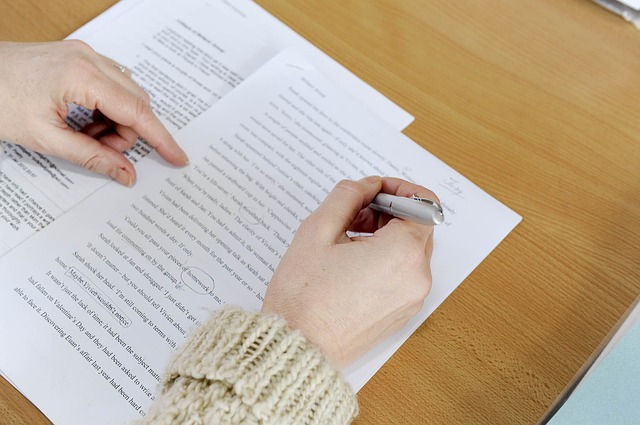Proofreaders check the grammatical, punctuation, spelling, and formatting errors of a document and create a proofreading checklist to track the revisions for a flawlessly written academic paper. The type of checklist proofreaders choose to utilize depends on the type of paper (e.g., dissertations, essays, e-books, or blog posts) they are working on.

A proofreader checks grammatical, punctuation, spelling, and formatting errors of a document and creates a proofreading checklist to track the revisions for a flawlessly written academic paper. The type of checklist proofreaders choose to utilize depends on the type of paper (e.g., dissertations, articles, essays, e-books, or blog posts) they are working on.
There are several jobs to keep track of in the process of creating a well-written manuscript. Having a proofreading checklist is essential because the last check can help proofreaders catch errors they would otherwise miss.
Proofreaders aim to provide your paper with proper scholarly and academic tone and style. They will significantly improve the chances of having your research manuscript accepted for publishing. Having considerable knowledge and expertise, they will help you find the right tone and style for your paper.
Proofreaders and editors make a brief list for developing the academic tone and style of your paper. For academic papers, proofreaders and writers should avoid using contractions, colloquialisms, and personal pronouns to make the documents have a formal tone. However, this principle does not apply to text directly quoted from a source. They should also be careful when picking adjectives to avoid colloquialisms. Colloquial and conversational terms and phrases should be avoided in academic writing.
Using personal pronouns, such as me, my, and us, is another issue that might affect the academic tone of a paper. Using personal pronouns must be avoided because they make your paper sound subjective and informal. As it is well known, academic papers should sound objective.
Using comprehensive advanced vocabularies in your paper is essential because this makes your paper appear to be of high quality, thereby giving the impression that it is well written. Hence, you always see some academic lexis when you obtain a proofreading service. Proofreaders and editors mostly use academic lexis to give the impression that the paper is a quality one. Using a reputable dictionary for the list of advanced vocabularies can help boost the academic level of your paper. Thus, proofreaders always have a dependable dictionary near at hand.
Using lexis is one of the first things one remembers when considering what proofreaders do. It is important because it demonstrates a deeper understanding of your topic and makes your manuscript more academic. A proofreading work adopts subject-area jargon and technical language, which can help in communicating a deeper understanding of the topic of your paper. Furthermore, using jargon inappropriately can impact the academic level of your paper negatively and gives the wrong impression that it is poorly written.

Appropriate citation and referencing format are essential parts of proofreading. Referencing is a crucial component of establishing the academic style of your paper because improper or imprecise referencing will significantly reduce the quality of your manuscript. Thus, proofreaders must be highly familiar with all the distinctions and nuances of the preferred referencing style.
Hence, proofreaders must check the publication manual to ensure consistent use of citation or referencing style. For instance, using et al., ampersand, or quotation marks is always a challenging issue for proofreaders. Let’s look at the et al. which is determined by the number of authors and whether it is the first time a reference has been cited in the paper. Some styles require it, while some do not. For instance, let us assume that your journal adapts the APA style; thus, proofreaders should check the APA manual. For the 6th Edition of APA style, for instance, articles with one or two authors include all names in every text citation; articles with three, four, or five author names plus et al. upon subsequent citations; and articles with six or more authors are abbreviated to the first author name plus et al. for all in-text citations.
As for the ampersand (&) or “and”, if the journal adopts the APA style, proofreaders should use an ampersand (&) instead of and. For the APA style, a proofreading job should name both authors in the signal phrase or in parentheses each time a reference is cited. They use the word “and” between the author names within the text and use the ampersand in parentheses. Here is an example for using the ampersand (&) or “and”: Research by Wegener and Petty (1994) supports the previous findings (Wegener & Petty, 1994).
Considering that minor issues will decrease the quality of your work, you better proofread your paper or have an editor or proofreader do the proofreading or editing for you. As discussed in one of our previous articles discussing What is Proofreading? or 9 Proofreading Tips for Academic Writing, proofreading is highly essential when you need your paper, manuscript, dissertation, or any type of academic writing to be checked for errors in grammar, punctuation, syntax, and spelling. Again, given that it necessitates language expertise to detect and correct grammar, punctuation, syntax, spelling, and vocabulary errors, we strongly advise you to hire a professional proofreader or editor.
Best Edit & Proof expert editors aim to provide your manuscripts with proper scholarly and academic tone and style. They will significantly improve the chances of having your research manuscript accepted for publishing. They provide subject-area proofreading and editing services in several fields categorized under various disciplines. With our extensive knowledge and expertise, we will help you find the right tone and style for your manuscript.
If you need our subject-area editors to format your manuscripts, giving you the fundamental rules for formatting your manuscripts as described in your guidelines, such as APA, MLA, or Chicago/Turabian styles, then contact us. At Best Edit & Proof, our proofreaders and editors edit every type of academic paper. We have a user-friendly website and a simplified ordering process.
If you would like our subject-area editors and language experts to work on your project for the improvement of its academic tone and style, then please visit the order page. It is easy! It takes only a few minutes to submit your paper and complete the process. Click here to see how it works.
We have flat-rate pricing based on our type of service (editing or proofreading), word count, and turnaround time. Enter your word count or copy and paste your document into our pricing calculator to get an instant quote.

If you need support for editing and proofreading services, contact us. You can also e-mail us or use the 24/7 live chat module to get direct support. We have a 24/7 active live chat mode to offer you direct support along with qualified editors to refine and furbish your manuscript. Alternatively, you can text us through our WhatsApp business line.
Follow us on Twitter, LinkedIn, Facebook, Instagram, and Medium.
For more posts, click here.
This article discusses everything you need to know about what proofreaders do. To give you an opportunity to practice proofreading, we have left a few spelling, punctuation, or grammatical errors in the text. See if you can spot them! If you spot the errors correctly, you will be entitled to a 10% discount.
How Much Do Professional Editing and Proofreading Cost?
01.02.2022
How Much Do Proofreading and Editing Cost?
19.06.2021
How to Choose a Dissertation Editor in 3 Steps
23.05.2022
8 Proofreading Tips: Everything to Understand the Process
30.04.2022
Dissertation Proofreading: Four Easy-to-Follow Steps
28.04.2022

No matter what type of article or content you're working on, editing and proofreading can do wonders to improve your work and give the perfect finishing touch to it. While many think that editing and proofreading are just formalities, these contribute to the quality of your work. Precisely why editing and proofreading are essential steps in the writing process and which have professionals dedicated to this field. If you, too, are wondering how these two activities can help you improve your work, this article is all that you will need.
Continue Reading
Most researchers do not fully comprehend the main difference between line editing and copyediting. Although there are some similarities between these two services (e.g., both take full note of the use of a manuscript’s language and involve improvements of the content, overall structure, and quality of the manuscript), there are still important differences between them.
Continue Reading
If you are a bilingual student having English as your second language, you would not doubt the necessity of proofreading or editing anything you write. Its importance goes one notch higher, when you are working on your academic thesis or dissertation. Are you looking for someone who can help you in editing a thesis or dissertation for you? Before you delve further to find out the right expert to edit or proofread your dissertation/thesis, read this article to know the nitty-gritty of thesis proofreading and editing.
Continue Reading
From the moment you started on your work, people advised you to rely on academic editing and proofreading services. But now that you are done with your work, and it is finally time for you to take advice, you realize you don’t really know much about academic editing. This guide is all-in-one for individuals like you who need to rely on academic editing and proofreading services but haven't a clue how things are done. We have noted down why you need these services, what happens through the processes, and how you can find a reliable service provider.
Continue Reading
Some researchers or college students do not want to rely on an editor or a proofreader, thinking that they might sabotage their work. However, that is seldom the case, or you have had very bad luck with your editor or proofreader. A perfect editor and/or proofreader will help you bring out the best version of your work while keeping the work true to its original form. This article gives you some helpful tips for finding the right editor and proofreader for your manuscript.
Continue Reading